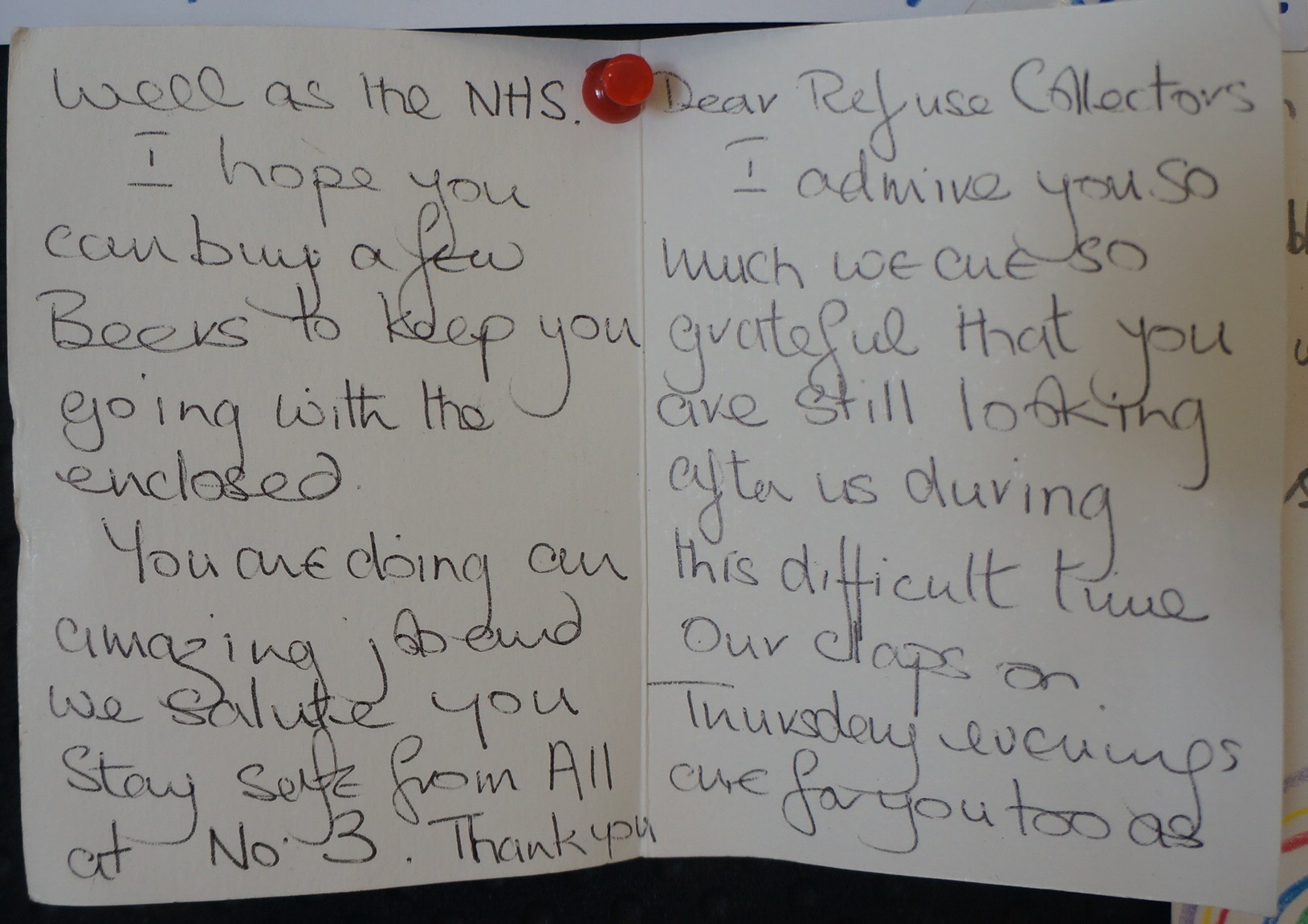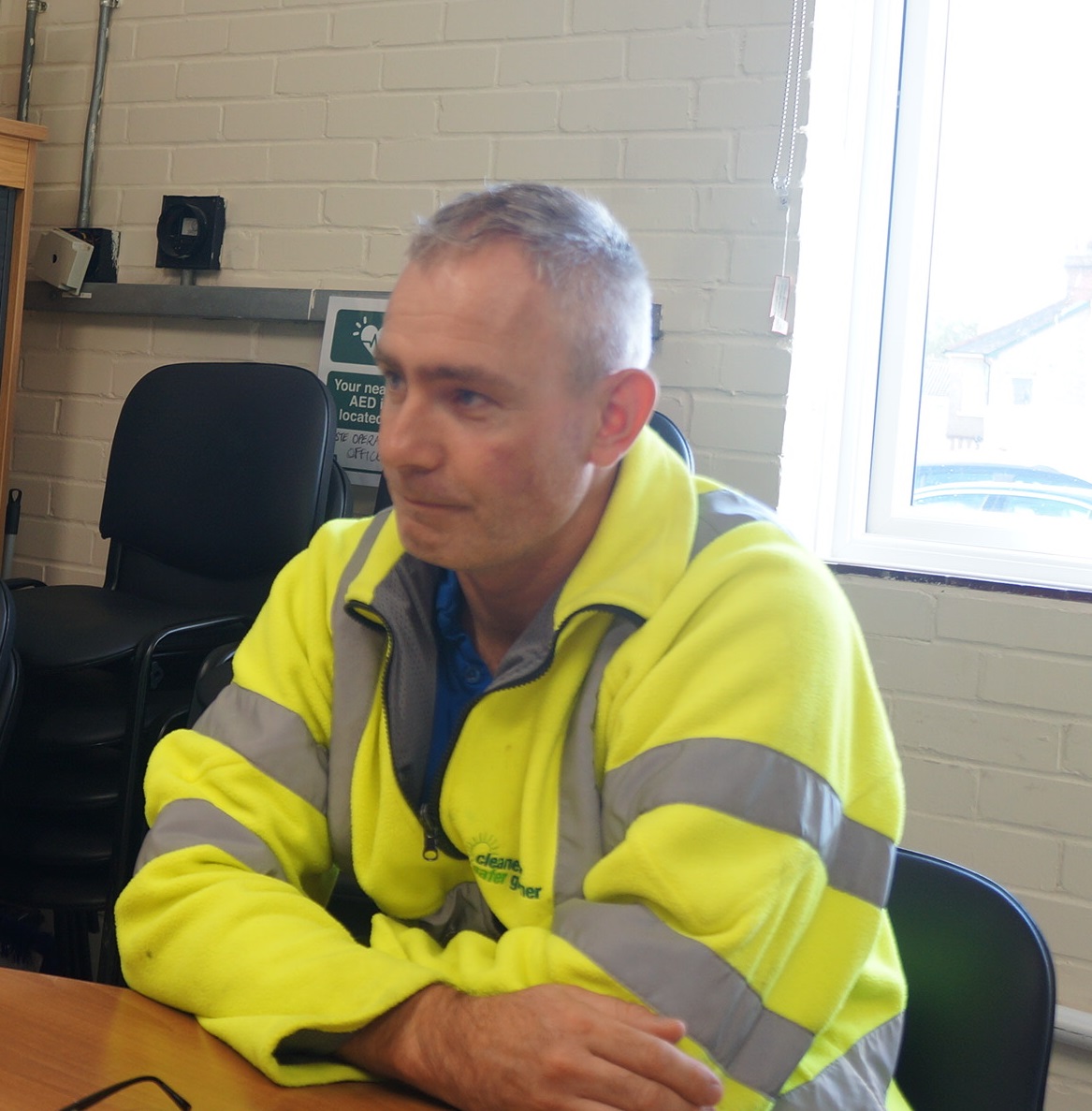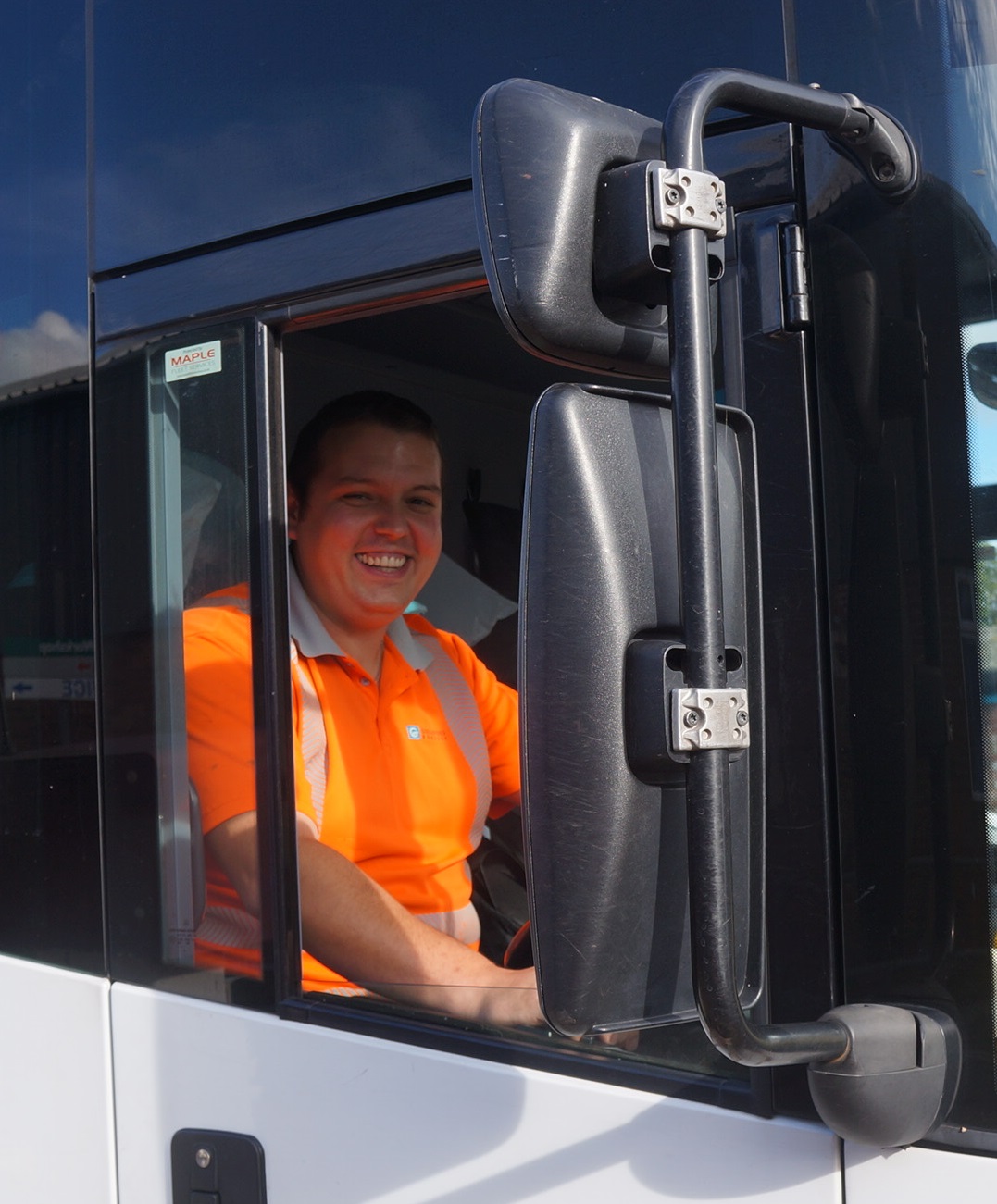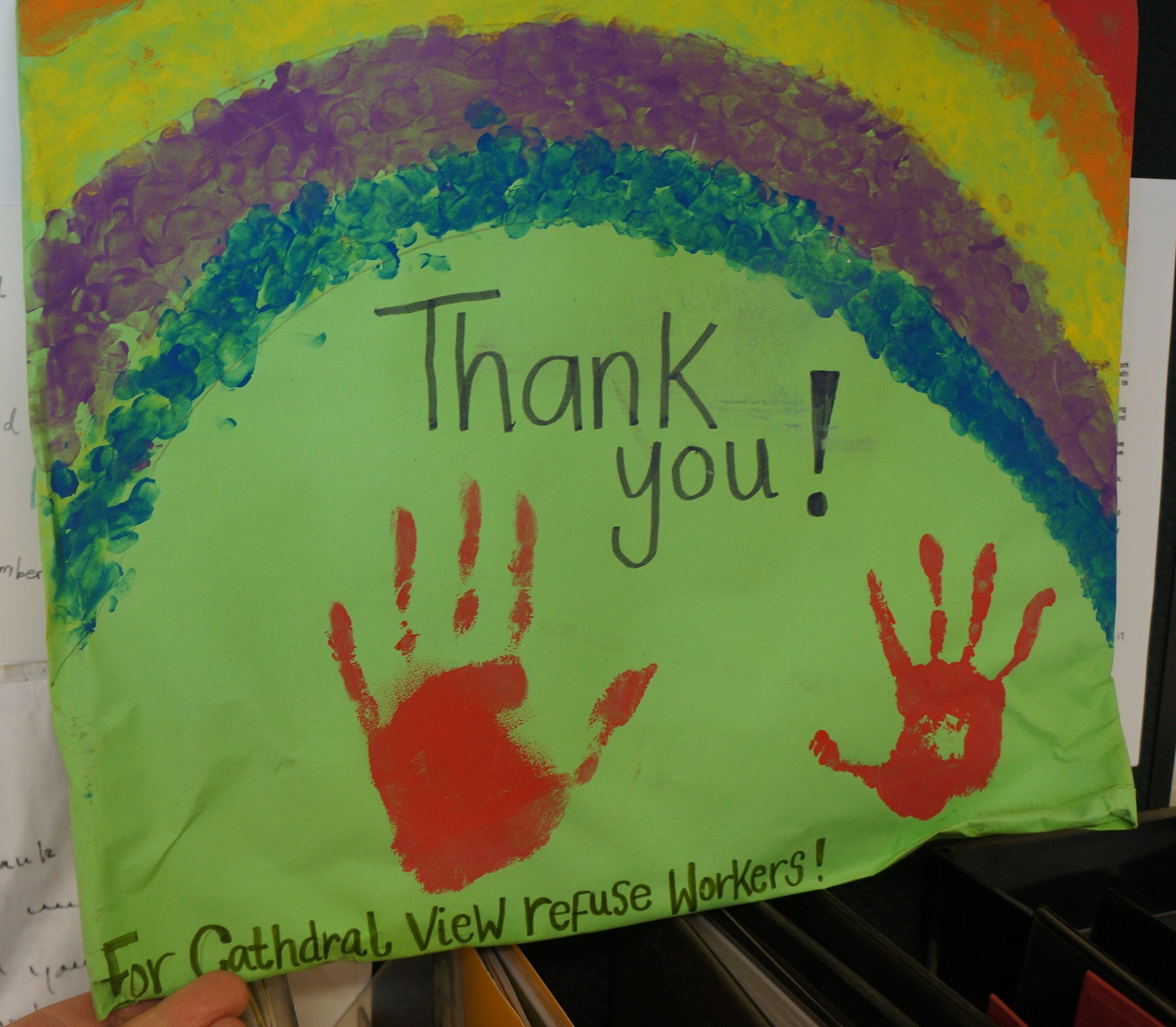 Abraham Lincoln
If given the truth, the people can be depended upon to meet any national crisis...
Abraham Lincoln
If given the truth, the people can be depended upon to meet any national crisis...
 Guildford news...
for Guildford people, brought to you by Guildford reporters - Guildford's own news service
Guildford news...
for Guildford people, brought to you by Guildford reporters - Guildford's own news service
Feature: Spotlight On Guildford’s Waste Operations Services
Published on: 22 Oct, 2020
Updated on: 23 Oct, 2020
Continuing our series of interviews with staff working with Guildford Borough Council on the often unsung work being done behind the scenes, we talked to the waste operations team collecting rubbish from houses and businesses in the borough.
We hear about the good bits of the job, the frustrations and the most common complaint from the public.
“I can’t imagine working in an office. I like the freedom,” said the smiling Csaba Dominyak, one of the staff working in Guildford’s waste operations.
Csaba works on the Gomshall round, driving one of the enormous 26-tonners, costing around £200,000 each, that pick up the rubbish from the 58,000 households in the borough.
Being of a certain age, I remember the dustmen in our street in London, lugging heavy bins over their shoulders, sometimes two at at time, and tipping them into the back of the dustcart.
Not surprisingly, a much more sophisticated operation nowadays means less lifting and sorting at the roadside.
I met with three of the staff at the council’s Woking Road depot, the base for its waste operations team – manager Paul Bennett, assistant supervisor and driving assessor Stuart Goodwin, and driver and loader Csaba Dominyak.
Paul – an ex-staff sergeant in the Royal Engineers, and with a string of other jobs such as Santa Claus in a garden centre, dustman, security work and floor layer, to his name – said: “I like managing people. It’s my thing.”
It is a huge daily operation to manage with 70 staff and a fleet of 41 vehicles ranging from around five tonnes (for the less accessible properties) to the largest 26-tonners.
Paul said that around 100 tonnes of food waste was collected weekly, 350 tonnes of refuse which will be dumped in landfill, and 300 tonnes of recycling.
That’s nearly 40,000 tonnes per year. A sobering thought.
And that doesn’t count the weekly 250 tonnes of garden waste from 22,000 houses for composting, or the waste from the 1,000 businesses which the council services as well.
Even though lifting heavy bins is generally in the past, the waste collection team still work hard.
The dustmen in our street fairly scoot along our road, with generally one chap – there are no females in the team currently – going ahead to position the wheely bins before being emptied into the back of the truck.
Paul Bennett said: “The crews had loads of appreciation during the Covid lockdown, people clapped and stuck letters to the bins. Sickness levels were fantastic. They are generally good at Christmas because of the tips but during Covid, the public feedback helped.

One thank you card from a grateful householder pinned on a whole wall of messages at the Woking Road depot.
Outside of Covid, feedback can be mixed. Paul said: “The most common complaint we get is that the bin is in the wrong place. People like their bins to be put back just where they left them.”

Assistant supervisor Stuart Goodwin said: “The wheelie bin collection is a lot safer for the crew and more efficient.”
Assistant supervisor for the waste operations Stuart Goodwin has worked in the team since 1999. He was 10 years on roadside collections. He is now a driving assessor for the council and is responsible for maintaining the fleet of 41 waste collections vehicles, all done by an in-house team at the depot.
Stuart said: “We do a lot of training here and it has improved things. The hardest thing is keeping a fleet of so many vehicles on the road.”
Csaba Dominyak worked in computer maintenance, petrol stations and on building sites in Hungary before coming to the UK seven years ago. He went back to Hungary to get his HGV licence so he could move from being one of the waste collection loaders to being a driver.
He said: “We plan our rounds to suit the narrow lanes and to try to miss the busy traffic times.
“People gave us hampers and biscuits during the lockdown. The first time people clapped us, I was surprised but I really liked it.
“The most frustrating part of the job is when there are delays due to traffic. You inevitably have the occasional accident steering through the narrow gaps but I love driving the truck.”
Paul added: “Dustcart drivers are probably the best HGV drivers in the business.”
Covid increased the waste collected by about 20% and garden waste went up by a third but it’s stabilising now, said Paul.
This affected the work of the waste collection teams a lot. Csaba said: “We would normally have to go to Slyfield or Ash transfer station to offload our trucks twice in a shift. That went up to three times.”
All of the waste collected is processed by the Surrey Environment Partnership (SEP), consisting of the 11 district and borough councils and the county council. The SEP in its annual report (2019/20) said it ranked joint fourth highest of England’s 31 two-tier authorities for recycling in 2018-19, with a recycling rate of 55.3%. This is against the national recycling rate of 45%, up from 11% in 2001.
The SEP says it expects the Government’s National Resources and Waste Strategy in 2018 will means significant changes to how waste is managed.
Proposals include making packaging producers responsible for paying for the full costs of managing their waste, having a deposit return scheme for drinks containers to encourage recycling rates and reduce litter and taxing producers of plastic packaging with less that 30% recycled plastic used.
That sounds like the right direction but is there the will to implement it and is it enough?
I fear our waste operations team will be collecting 40,000 tonnes of rubbish and more each year for many years to come.
Responses to Feature: Spotlight On Guildford’s Waste Operations Services
Leave a Comment Cancel replyPlease see our comments policy. All comments are moderated and may take time to appear.
Recent Articles
- Guildford Institute’s Crowdfunding Project for Accessible Toilet in its New Community and Wellbeing Centre
- Letter: Guildford – Another Opportunity Missed?
- Letter: GBC’s Corporate Strategy – Where Is the Ambition?
- My Memories of John Mayall at a Ground-breaking Gig in Guildford Nearly Six Decades Ago
- Westborough HMO Plans ‘Losing the Heart of the Street’ Says Resident
- College Invests to Boost Surrey’s Economy and Close Digital Skills Gap
- Community Lottery Brings Big Wins for Local Charities
- GBC Housing Plan Promises ‘A Vibrant Urban Neighbourhood’ Near Town Centre
- Hospital Pillows ‘Shortage’ at the Royal Surrey
- Updated: Caravans Set Up Camp at Ash Manor School


Recent Comments
- Ian Macpherson on Updated: Main Guildford to Godalming Road Closed Until August 1
- Sara Tokunaga on GBC Housing Plan Promises ‘A Vibrant Urban Neighbourhood’ Near Town Centre
- Michael Courtnage on Daily Mail Online Reports Guildford Has Highest-paid Council Officer
- Alan Judge on GBC Housing Plan Promises ‘A Vibrant Urban Neighbourhood’ Near Town Centre
- John Perkins on GBC Housing Plan Promises ‘A Vibrant Urban Neighbourhood’ Near Town Centre
- S Collins on GBC Housing Plan Promises ‘A Vibrant Urban Neighbourhood’ Near Town Centre
Search in Site
Media Gallery
Dragon Interview: Local Artist Leaves Her Mark At One of England’s Most Historic Buildings
January 21, 2023 / No Comment / Read MoreDragon Interview: Lib Dem Planning Chair: ‘Current Policy Doesn’t Work for Local People’
January 19, 2023 / No Comment / Read MoreA3 Tunnel in Guildford ‘Necessary’ for New Homes, Says Guildford’s MP
January 10, 2023 / No Comment / Read More‘Madness’ for London Road Scheme to Go Ahead Against ‘Huge Opposition’, Says SCC Leader
January 6, 2023 / No Comment / Read MoreCouncillor’s Son Starts Campaign for More Consultation on North Street Plan
December 30, 2022 / No Comment / Read MoreCounty Council Climbs Down Over London Road Works – Further ‘Engagement’ Period Announced
December 14, 2022 / No Comment / Read MoreDragon Interview: GBC Reaction to the Government’s Expected Decision to Relax Housing Targets
December 7, 2022 / No Comment / Read MoreHow Can Our Town Centre Businesses Recover? Watch the Shop Front Debate
May 18, 2020 / No Comment / Read More















Jan Messinger
October 22, 2020 at 3:56 pm
What an interesting article this was. Just what residents need to be reminded of, the good work done taking the thousands of tons of rubbish from people’s households. We should remember when buying online that we are creating even more often unnecessary rubbish. I hope people realise how much all this costs.
Of course, the rubbish left alongside our roads from flytipping etc adds to the tremendous amount of rubbish we create in this borough.
Thank you to Guildford Borough Council workers for the rubbish collection. We would look a whole lot worse if it wasn’t for their daily work.
If only those residents who continue to throw litter from vehicles or just drop it wherever they are would be as thoughtful and conscientious as the team who collect our rubbish every day.
Kalwant Ajimal
October 22, 2020 at 8:48 pm
As an inspector for the Audit Commission, I investigated over 20 waste management services. The critical outcomes were underfunding, poor long-range plans and sometimes almost scandalous outsourcing.
Fiona Yeomans
October 24, 2020 at 3:35 pm
Excellent article, thank you. I have made a point of going out to thank the hardworking team on many Tuesday mornings.
We try to make sure we put everything for recycling into the green bin but worry about what happens to it after it leaves Slyfield. Would you do a report at some stage about the further destinations? Hope our plastics don’t end up on a beach in Turkey.